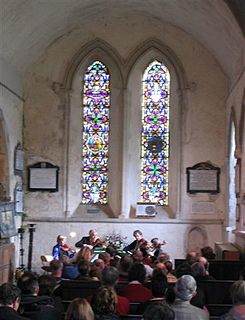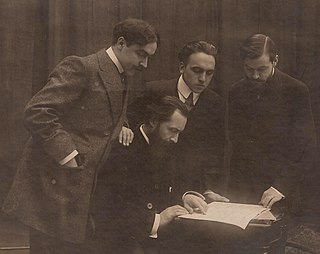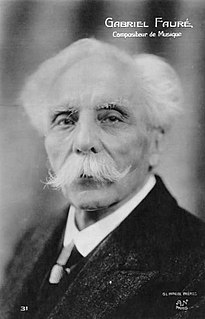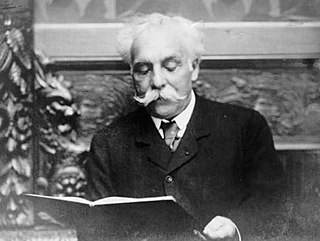The Belcea Quartet is a string quartet, formed in 1994, under the leadership of violinist Corina Belcea.

The Emerson String Quartet, also known as the Emerson Quartet, is a professional string ensemble – in residence at the Stony Brook University. During the 1980s the musical ensemble was in residence at The Hartt School located in West Hartford, Connecticut. Choosing American poet and philosopher Ralph Waldo Emerson as namesake, the quartet formed at the Juilliard School as a student ensemble. They turned professional in 1976, with both of their violinists having studied under the tutelage of the renowned Oscar Shumsky, alternating as first and second violinists. When it was formed, the Emerson Quartet was one of the first with the two violinists alternating chairs.

The Lindsay String Quartet was a British string quartet from 1965 to 2005.
The Ysaÿe Quartet was a French string quartet that was founded in 1984 by students at the Conservatoire de Paris named after the original Ysaÿe Quartet. It ended its existence in January 2014.
The Melos Quartet, also called the Melos Quartet Stuttgart, is a German string quartet musical ensemble based in Stuttgart, that was in existence from 1965 to 2005.

The Arpeggione Quartet is a French string quartet, led by Isabelle Flory (violin), with Nicholas Risler (violin), Patrick Dussart (viola), and Marie-Thérèse Grisenti (cello).
The Hollywood String Quartet (HSQ) was an American string quartet founded by violinist/conductor Felix Slatkin and his wife cellist Eleanor Aller. The Hollywood String Quartet is considered to be the first American-born and trained classical music chamber group to make an international impact, mainly through its landmark recordings. These recordings have long been regarded as among the most outstanding recorded performances of the string quartet repertoire.
Maurice Ravel completed his String Quartet in F major in early April 1903 at the age of 28. It was premiered in Paris in March the following year. The work follows a four-movement classical structure: the opening movement, in sonata form, presents two themes that occur again later in the work; a playful scherzo second movement is followed by a lyrical slow movement. The finale reintroduces themes from the earlier movements and ends the work vigorously.

The Capet String Quartet was a French musical ensemble founded in 1893, which remained in existence until 1928 or later. It made a number of recordings and was considered one of the leading string quartets of its time.
The Pascal Quartet was a French string quartet musical ensemble which took shape during the early 1940s and emerged after World War II to become a leading representative of the French performance tradition. It was named after its founder, the viola player Léon Pascal, and was occasionally termed the Leon Pascal Quartet.
The Krettly Quartet was a French string quartet musical ensemble active during the 1920s and 1930s. Its repertoire included avant-garde and modern works, and the group made early recordings of some of these.
Modigliani Quartet is a French string quartet founded in Paris in 2003 by four close friends, following their studies at the Conservatoire de Paris.
The Trio Wanderer is a French piano trio made up of Vincent Coq piano, Jean-Marc Phillips-Varjabédian violin and Raphaël Pidoux cello. Trio Wanderer’s members were all graduated from the Conservatoire de Paris. They studied with such masters as Jean-Claude Pennetier, Jean Hubeau, Janos Starker, Menahem Pressler from the Beaux Arts Trio, and the Amadeus Quartet. In 1988 they won the ARD Competition in Munich, and in 1990 the Fischoff Chamber Music Competition in the USA.
The Loewenguth Quartet was a string quartet music ensemble led by the French violinist Alfred Loewenguth. It was particularly famous for performances of classical repertoire such as Beethoven, Mozart and Haydn quartets, and was active from the 1930s to the 1970s.
The Virtuoso String Quartet was a British quartet, founded by the Gramophone Company in 1924 to be the first such quartet established specifically for recording. In effect they displaced the Catterall Quartet from their position recording for HMV.

Introduction and Allegro for Harp, Flute, Clarinet and String Quartet was written by Maurice Ravel in 1905. It premiered on 22 February 1907 in Paris.

Gabriel Fauré'sString Quartet in E minor, Op 121, is his last work, completed in 1924 shortly before his death at the age of 79. His pupil Maurice Ravel had dedicated his String Quartet to Fauré in 1903, and he and others urged Fauré to compose one of his own; he declined, on the grounds that it was too difficult. When he finally decided to write it, he did so in trepidation.
Alfred Loewenguth was a 20th-century French classical violinist.

The Parisii Quartet is a French string quartet ensemble founded in 1981.
The Ludwig Quartet is a French string quartet ensemble founded in 1985 and leading an international career. It is composed of Thierry Brodard, Manuel Doutrelant, Padrig Fauré (viola) and Anne Copéry (violoncello).



















